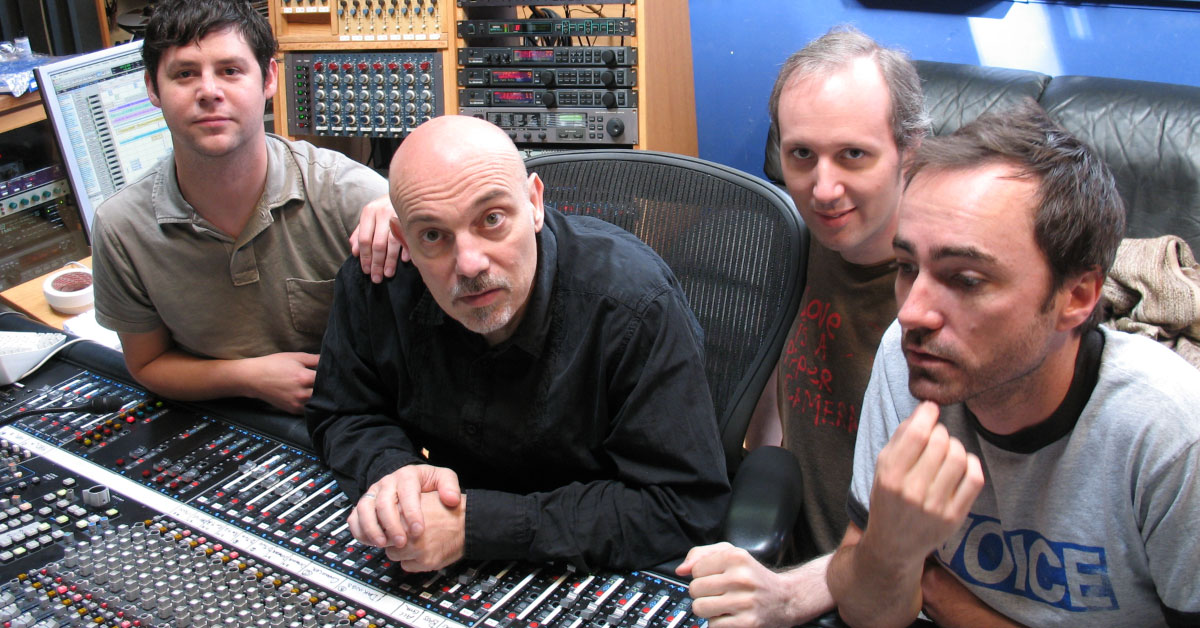Genre is just another word to producer Joe Chiccarelli. For the past several decades, Joe has been making hit records with artists from Charly Bliss to The White Stripes to Morrissey. He approaches each album as a dive into the musical deep end with the artist — getting motivated by their creative risks while developing a sonic vision that is bespoke to the project-in-progress.
The HUB: Hey, Joe! Tell us a little about your background.
Joe Chiccarelli: I’m a producer and engineer, and mixer. I live in Los Angeles, and I’ve been making records for 20+ years. I started out as a bass player in a bunch of failed bands back East, and moved to California. Through a lucky break I got a gig in a recording studio and just worked my way up and been making records ever since. I’ve had the good fortune to work on a lot of great projects, great artists — Beck, U2, Elton John, The Strokes, The Killers, Alanis Morissette, Morrissey, Jason Mraz, and many others.
The HUB: What first inspired you to produce music?
JC: I don’t know if there’s one album that inspired me, but I was always the guy in the band who was the techy geek that cared about the guitar player’s sound, or had a vision for the concept of the band. I was always the kid that read every liner note and followed producers. And so I’m not sure if there’s one musical moment that inspired me but I was always keen on the process, how records got made, the backstory.
Young the Giant's debut album was produced and recorded by Joe Chiccarelli at Sunset Sound Studios in Hollywood, CA.
The HUB: What are some records you worked on that changed you as a producer?
JC: Wow, good question. A number of them. You know, every project is different. You learn something new with everything you do. Back in the ‘90s I did a record with a band called American Music Club from San Francisco, and I had to really dive so deep into the songs emotionally to make them come to life. It was a really great education about the level of commitment that I had to have for every single project I worked on. I got to work with great artists like Etta James and saw what a great singer could do in one take. Working with Beck, I mean, he’s just such a master manipulator of music and sound. I think maybe the biggest thing for me is taking chances. I like artists that dive into the deep end of the pool, that really try to reinvent themselves on every album, that just push boundaries.
The HUB: Can you share an anecdote about diving in deep and discovering the sound for a record?
JC: There was one instance on the White Stripes record where I was looking for a particular sound. I really wanted the particular song to sound like this blown up Detroit garage Rock record, and no matter what I did with blowing up gear in the studio, I couldn't get that sound. And that particular record was done on analog tape so there are no plug-ins, there’s no digital processing at all—nothing that was a push of a button to get the distorted, old ‘70s recording that I was looking for, like MC5 kind of recording. But one day the assistant engineer plugged in the stereo bus backwards and it made the entire mix blown up and distorted, and it was exactly 100% the sound that I had been looking for for weeks. So we then had to figure out a way to capture that distortion, and all the things that went wrong in that moment, and make them a part of the record and blend them in with the natural sounding tracks because you wanted it to be modern and punchy, but you still wanted that character. So we finally figured out a way to print that distortion and then blend it in with the rest of the music.
The White Stripes' album ICKY THUMP was recorded and mixed by Joe Chiccarelli at Blackbird Studio in Nashville, TN.
The HUB: You record at many different studios. How does the location you choose affect the the sound of the record?
JC: The environment truly affects the music being recorded. With Morrissey we love going to La Fabrique in France because it’s so secluded and peaceful. You just lock the doors behind you and focus on the music. With My Morning Jacket we chose NYC because the music needed a jolt of life to it. It was great to walk to the studio in the morning and experience the nightlife at the end of a sessions day. The city became part of the music. Even being fortunate enough to work in Sunset Sound daily where The Stones, Led Zeppelin, Sinatra, Beck have all recorded .... I think artists feel they have to bring their best performances to be in the company of the studio’s history.

(left) Joe Chiccarelli mixing Morrissey at Studios La Fabrique in the south of France (right) Charly Bliss tracking with Joe at Sunset Sound.
The HUB: Are there any pieces of gear that you always use?
JC: It’s all good. I mean, you gotta have a great microphone, you have to have a great preamp and a great chain. Neumann U67s are amazing. Neve modules are amazing. UREI 1176s are amazing. I mean, there’s great things that have become part of the sound of modern rock and pop music, but there’s plenty of other gear out there that sounds just great. And I think you can use anything, any piece of gear—expensive, cheap, old, new—to get what you want. You just have to have the picture—the vision to get whatever it is that you're looking for—and you’ll figure out a way how to do it with whatever it is you're given equipment-wise.
The HUB: What are the biggest changes you've seen over the course of your career, both technology and process-wise?
JC: The technological changes happen all the time—sometimes fast, sometimes slow. I don’t get too hung up on those because again they’re just process to me. I think the biggest changes that have happened are within the record business and how records are distributed to the world—how accessible or not accessible, who’s in control of those distribution chains—those are the real key things that have happened. And I think the great thing about now is that we really live in a time where the artist has control of their own music, their own future, and for a long time that was not the case. So I think it’s really exciting that an artist can, for a small investment, buy the kind of gear that they need, go home, really concentrate on honing their sound, developing what it is they want to say. They can do it on their own or they can at least take it to a certain level where they then need outside help, where decades ago you couldn't do that. You needed an expensive studio and all. So the fact that there’s this commonality that we all can speak the same language, all use the same tools, all have access to reaching a lot of people, that's fantastic to me. That’s exciting.
The Strokes' album ANGLES, with songs produced by Joe Chiccarelli at Avatar Studios in New York City.
The HUB: As a producer, what do you bring to the sound of a project?
JC: You know what—honestly, I feel like I’m playing this game of catch up. I’m really serious. I feel like holy shit, this is an amazing artist. I’ve got to deliver something that's at their level. I’ve got to better what I do. But also you know, as a producer, as an engineer, you're there to serve their vision. It’s really important to me that I bond with the artist, that I understand what they’re trying to do. I’m humbled by great talent, I want to serve that, and I want to help them make better records. Yes of course I think about the marketplace, and radio, and everything else that comes in—that's part of the job of being a producer—but ultimately it’s not my record. At the end of the day I move on to another project and they’ve got to live with this recording for some time so I want them to be happy. That’s really important to me.
Charly Bliss's album YOUNG ENOUGH was produced by Joe Chiccarelli at Sunset Sound in Hollywood, CA.
The HUB: What advice do you have to new producers?
JC: I think the one thing that sometimes we all get caught up in is we live in a very narrow world. In other words if your tastes are just heavy metal, or your taste is just hip-hop, that's all you listen to, that's all you immerse yourself into—and that’s great because you live it, and you want to be a part of it—but I also think listening to a lot of different types of music and bringing in, soaking in the things that make it work is a really great education. It’s like being a great writer, or a great painter. If you read lots of other fiction, and non-fiction, or if you follow abstract expressionists, you gain things by looking at other artists and how they view the world, and I think you sort of incorporate that into your own work and it brings about a much more interesting and unique picture as opposed to being so single-minded. So I would encourage people to really listen to a lot of different types of music.
The HUB: Is there any sound that you're still chasing?
JC: I’m just chasing a good record. I want to make a Talking Heads album, or a Miles Davis record, something that I feel stands the test of time. I think maybe there’s moments within 10 songs of a record where it all clicked and it works, but I don’t really feel like I’ve yet had that one album where I feel like holy shit, we did it. You know, this is, as a work of 10 songs, not only something that serves the artist, but everybody enjoys, that's sort of Kind of Blue.
Half Moon Run’s album A BLEMISH IN THE GREAT LIGHT was produced and recorded by Joe at Planet Studios in Montreal, Canada.







































































































































